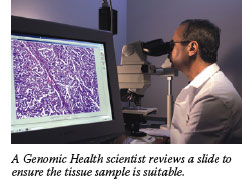
More Individualized Treatment Pursued in Breast Cancer Trial
 The launch today of a new clinical trial is being hailed by some of the nation's leading breast cancer researchers as an important step toward more individualized treatment of cancer based on factors such as the expression of specific genes within patients' tumor cells.
The launch today of a new clinical trial is being hailed by some of the nation's leading breast cancer researchers as an important step toward more individualized treatment of cancer based on factors such as the expression of specific genes within patients' tumor cells.
The NCI-sponsored trial, dubbed TAILORx, will use the results of a new test that measures the activity of 21 genes in tumor samples from women with early-stage invasive breast cancer that is estrogen-receptor positive and lymph node-negative to assign participants to their treatment regimen.
The Eastern Cooperative Oncology Group (ECOG) is leading TAILORx, and all NCI-sponsored clinical trials groups that perform breast cancer research are participating in the trial.
A number of studies, including one released early online today by the Journal of Clinical Oncology (JCO), have demonstrated that the test - Oncotype DX, developed by Genomic Health, Inc. - is highly accurate at predicting the risk of recurrence among women with this type of cancer and whether they will benefit from adjuvant chemotherapy.
Determining whether to use adjuvant chemotherapy is a critical issue, says Dr. Jo Anne Zujewski, of NCI's Cancer Therapy Evaluation Program. Although about 90 percent of women with this type of breast cancer are advised to undergo adjuvant chemotherapy, she explains, studies have shown that it decreases recurrence risk in only a small percentage of them.
"A large number of these women are receiving toxic chemotherapy unnecessarily, and we need a means of identifying them," Dr. Zujewski says. "TAILORx could help change the way we treat breast cancer, helping to better identify women who are likely to benefit from chemotherapy and those who are not."
In the JCO study, women who had a high "recurrence score" on Oncotype DX - 31 or higher on a 0 to 100 scale - were far less likely to experience disease recurrence over the next 15 years after chemotherapy. For women with low scores (18 or less), adjuvant chemotherapy appeared to have little impact on their recurrence risk. The study, the initial results of which were presented in December 2004, tested tumor samples from 651 patients who received adjuvant tamoxifen and chemotherapy as part of the National Surgical Breast and Bowel Project-conducted B-20 trial.
Although TAILORx should help to confirm these findings, the trial's primary goal, says Dr. Sheila E. Taube, director of NCI's Cancer Diagnosis Program, is to determine whether Oncotype DX can guide the course of treatment for women who have recurrence scores of 11 to 25. The limited number of tumor samples in studies to date that have scored in this range precludes researchers from answering this question. But in TAILORx, nearly 4,400 of the more than 10,000 expected participants will fall into the 11 to 25 range.
In TAILORx, participants with a recurrence score of more than 25 will receive chemotherapy plus hormonal therapy; women with a recurrence score of less than 11 will receive hormonal therapy alone; and women with a recurrence score of 11 to 25 will be randomly assigned to receive adjuvant hormonal therapy, with or without chemotherapy.
By Carmen Phillips
|